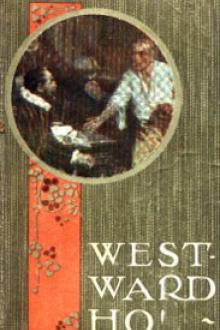Westward Ho! Or, The Voyages and Adventures of Sir Amyas Leigh, Knight, of Burrough, in the County of Devon, in the Reign of Her Most Glorious Majesty Queen Elizabeth by - (acx book reading .TXT) 📖

- Author: -
Book online «Westward Ho! Or, The Voyages and Adventures of Sir Amyas Leigh, Knight, of Burrough, in the County of Devon, in the Reign of Her Most Glorious Majesty Queen Elizabeth by - (acx book reading .TXT) 📖». Author -
“You forgive me?” cried he.
“Forgive you?” and she burst into tears again.
Frank burst into tears also.
“Let me go back, and die with her—Amyas!—my oath!—my honor!” and he struggled to turn back.
Amyas looked back too, and saw her standing calmly, with her hands folded across her breast, awaiting Eustace and the servants; and he half turned to go back also. Both saw how fearfully appearances had put her into Eustace's power. Had he not a right to suspect that they were there by her appointment; that she was going to escape with them? And would not Eustace use his power? The thought of the Inquisition crossed their minds. “Was that the threat which Eustace had whispered?” asked he of Frank.
“It was,” groaned Frank, in answer.
For the first and last time in his life, Amyas Leigh stood irresolute.
“Back, and stab her to the heart first!” said Frank, struggling to escape from him.
Oh, if Amyas were but alone, and Frank safe home in England! To charge the whole mob, kill her, kill Eustace, and then cut his way back again to the ship, or die,—what matter? as he must die some day,—sword in hand! But Frank!—and then flashed before his eyes his mother's hopeless face; then rang in his ears his mother's last bequest to him of that frail treasure. Let Rose, let honor, let the whole world perish, he must save Frank. See! the negroes were up with her now—past her—away for life! and once more he dragged his brother down the hill, and through the wicket, only just in time; for the whole gang of negroes were within ten yards of them in full pursuit.
“Frank,” said he, sharply, “if you ever hope to see your mother again, rouse yourself, man, and fight!” And, without waiting for an answer, he turned, and charged up-hill upon his pursuers, who saw the long bright blade, and fled instantly.
Again he hurried Frank down the hill; the path wound in zigzags, and he feared that the negroes would come straight over the cliff, and so cut off his retreat: but the prickly cactuses were too much for them, and they were forced to follow by the path, while the brothers (Frank having somewhat regained his senses) turned every now and then to menace them: but once on the rocky path, stones began to fly fast; small ones fortunately, and wide and wild for want of light—but when they reached the pebble-beach? Both were too proud to run; but, if ever Amyas prayed in his life, he prayed for the last twenty yards before he reached the water-mark.
“Now, Frank! down to the boat as hard as you can run, while I keep the curs back.”
“Amyas! what do you take me for? My madness brought you hither: your devotion shall not bring me back without you.”
“Together, then!”
And putting Frank's arm through his, they hurried down, shouting to their men.
The boat was not fifty yards off: but fast travelling over the pebbles was impossible, and long ere half the distance was crossed, the negroes were on the beach, and the storm burst. A volley of great quartz pebbles whistled round their heads.
“Come on, Frank! for life's sake! Men, to the rescue! Ah! what was that?”
The dull crash of a pebble against Frank's fair head! Drooping like Hyacinthus beneath the blow of the quoit, he sank on Amyas's arm. The giant threw him over his shoulder, and plunged blindly on,—himself struck again and again.
“Fire, men! Give it the black villains!”
The arquebuses crackled from the boat in front. What were those dull thuds which answered from behind? Echoes? No. Over his head the caliver-balls went screeching. The governors' guard have turned out, followed them to the beach, fixed their calivers, and are firing over the negroes' heads, as the savages rush down upon the hapless brothers.
If, as all say, there are moments which are hours, how many hours was Amyas Leigh in reaching that boat's bow? Alas! the negroes are there as soon as he, and the guard, having left their calivers, are close behind them, sword in hand. Amyas is up to his knees in water—battered with stones—blinded with blood. The boat is swaying off and on against the steep pebble-bank: he clutches at it—misses—falls headlong—rises half-choked with water: but Frank is still in his arms. Another heavy blow—a confused roar of shouts, shots, curses—a confused mass of negroes and English, foam and pebbles—and he recollects no more.
He is lying in the stern-sheets of the boat; stiff, weak, half blind with blood. He looks up; the moon is still bright overhead: but they are away from the shore now, for the wave-crests are dancing white before the land-breeze, high above the boat's side. The boat seems strangely empty. Two men are pulling instead of six! And what is this lying heavy across his chest? He pushes, and is answered by a groan. He puts his hand down to rise, and is answered by another groan.
“What's this?”
“All that are left of us,” says Simon Evans of Clovelly.
“All?” The bottom of the boat seemed paved with human bodies. “Oh God! oh God!” moans Amyas, trying to rise. “And where—where is Frank? Frank!”
“Mr. Frank!” cries Evans. There is no answer.
“Dead?” shrieks Amyas. “Look for him, for God's sake, look!” and struggling from under his living load, he peers into each pale and bleeding face.
“Where is he? Why don't you speak, forward there?”
“Because we have naught to say, sir,” answers Evans, almost surlily.
Frank was not there.
“Put the boat about! To the shore!” roars Amyas.
“Look over the gunwale, and judge for yourself, sir!”
The waves are leaping fierce and high before a furious land-breeze. Return is impossible.
“Cowards! villains! traitors! hounds! to have left him behind.”
“Listen you to me, Captain Amyas Leigh,” says Simon Evans, resting on his oar; “and hang me for mutiny, if you will, when we're aboard, if we ever get there. Isn't it enough to bring us out to death (as you knew yourself, sir, for you're prudent enough) to please that poor young gentleman's fancy about a wench; but you must call coward an honest man that have saved your life this night, and not a one of us but has his wound to show?”
Amyas was silent; the rebuke was just.
“I tell you, sir, if we've hove a stone out of this boat since we got off, we've hove two hundredweight, and, if the Lord had not fought for us, she'd have been beat to noggin-staves there on the beach.”
“How
 Have you ever thought about what fiction is? Probably, such a question may seem surprising: and so everything is clear. Every person throughout his life has to repeatedly create the works he needs for specific purposes - statements, autobiographies, dictations - using not gypsum or clay, not musical notes, not paints, but just a word. At the same time, almost every person will be very surprised if he is told that he thereby created a work of fiction, which is very different from visual art, music and sculpture making. However, everyone understands that a student's essay or dictation is fundamentally different from novels, short stories, news that are created by professional writers. In the works of professionals there is the most important difference - excogitation. But, oddly enough, in a school literature course, you don’t realize the full power of fiction. So using our website in your free time discover fiction for yourself.
Have you ever thought about what fiction is? Probably, such a question may seem surprising: and so everything is clear. Every person throughout his life has to repeatedly create the works he needs for specific purposes - statements, autobiographies, dictations - using not gypsum or clay, not musical notes, not paints, but just a word. At the same time, almost every person will be very surprised if he is told that he thereby created a work of fiction, which is very different from visual art, music and sculpture making. However, everyone understands that a student's essay or dictation is fundamentally different from novels, short stories, news that are created by professional writers. In the works of professionals there is the most important difference - excogitation. But, oddly enough, in a school literature course, you don’t realize the full power of fiction. So using our website in your free time discover fiction for yourself. 




Comments (0)